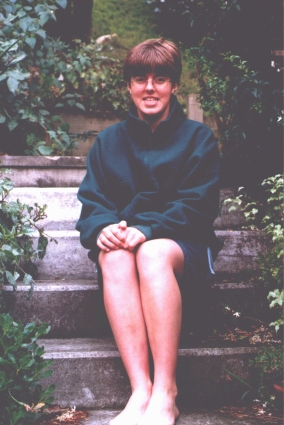

I have been a cellist for three and 3/4 years, which seems like quite a long time. The reason for starting cello in 1997 was that I wanted to play another instrument (I have played violin since 1992), but did not want to play the viola (which was the suggestion of my friends -- "You have long arms...." -- and even my violin teacher!). At that stage I did not know about the existence of viola jokes, or even the viola stigma (not stigmata -- they do not practice enough to get one of those desirable red or brown marks on the left side of the neck).
I started at a Community Music School, but my lessons were quite informal because I was in a group. It was also my first experience of non-Suzuki music teaching, and I was amazed that so many people could play so badly, and were so unmotivated to practice. Why play an instrument if you do not want to become proficient? So, for the first year I was never really taught anything. I bought an All for Strings book to learn about fingering, a beautiful book of photos of cellists, and Suzuki Cello Book I, and worked through them all. I practiced in front of a mirror, making reference to the photos and was pleased to see that I looked like a cellist (not a violinist playing the cello!). I wasn't sure at the end of the year whether I wanted to keep on playing, but I went to a Summer Suzuki camp and had some private lessons, and, having learnt some cellistic technique, felt much happier.
In 1998 I was at the CMS again, but this time I had a lovely teacher who stayed on late to give me some private lessons. I learnt a lot from her and enjoyed my lessons very much. In the February of 1998 I auditioned for the New Zealand Post Wellington Youth Orchestra, and suddenly I found that I was desperate to be a musician. That year we played Schubert's Unfinished Symphony, Brahms' Fourth Symphony, Bruckner's Eighth Symphony, and Beethoven's Ninth Symphony, as well as Schoenberg's Survivor from Warsaw. Having never played in an orchestra before it was very hard work. I attended every N.Z. Symphony Orchestra concert and found that music (especially the German Late Romantic repertoire and Second Viennese School) mesmerizes me and I get so caught up in the often devastating beauty. It seems to be more enduring and enthralling than any other music, especially to play. However, the most compelling sensation was that This-is-what-I-want-to-do-and-all-the-time feeling. Is it healthy to sacrifice one's life on the Shrine of Mahler at the tender age of 15? It seemed like a good thing at the time, and I seem unable to escape now. Last year and this year we have continued to play other wonderful pieces and they seem to have added a lot to my philosophy! I think that we are very lucky because we have an excellent conductor who does not so much inspires us as put the music in front of us with the expectation that we will play it well. Thankfully we usually do.
In August 1999 I started having proper lessons, almost weekly, and have discovered modal scales, Dotzauer, Schroeder and Bach. I love to play Bach, especially as this year is his 250th anniversary. I have read a lot about him, and what he wrote (not music, letters etc.) and it makes him seem very alive. So many people worry about Bach -- "Am I doing this right? Should I play it this way? What sound should I achieve?" -- without remembering that he himself was a mortal who suffered the foibles of human kind. He was divinely inspired, and a genius, but he was still human. However, I do not want to sound blasphemous, and do not want to suggest that I play Bach in a shoddy manner -- I try my hardest to play the best I can.
One of the most wonderful things about playing the cello is that it has given me the fortuity of being able to explore the repertoire of another stringed instrument, and to contrast and correlate the differences and similarities between these two marvelous and evocative instruments. They can both portray the same emotions in black and white, but they can also depict the infinite number of shades of gray. An example of this analogy is the solo Bach works. Both the violin and cello works are completely different, while containing many similarities. Part of this has to do with J.S. Bach, of course, and his knowledge of what these two instruments can yield, but part has to do with the individual instrument and the person playing it. Thanks to the cello, I feel that my musical perceptions have been infused with a greater meaning and understanding.
The ICS has been very beneficial too. I have been able to learn much more about the cello, cellists, repertoire, orchestras, Instruments and Equipment, psychological seasonal disorders, doughnuts, and many other aspects of life! Now all the Cello Chatters who have been so constantly amazed by my audacity and, ahem, blathering, will be able to see what I look like!

| Direct correspondence to the appropriate ICS
Staff Webmaster: "webmaster" Director: John Michel Copyright © 1995- Internet Cello Society |
|---|